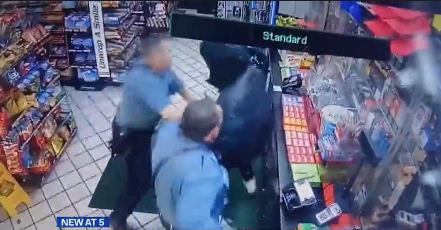It has been over one year since Malcolm Johnson, a 31-year-old Black man, died after a fatal police encounter, but the investigation into his death is still ongoing and activists are demanding answers.
On March 25, 2021, Mr. Johnson was in a BP gas station in Kansas City, Missouri, when two officers entered guns drawn. In a surveillance video from the gas station, Mr. Johnson tries to run, but the officers grab him. They then go out of frame. A cell phone video of the incident was later released showing several officers on top of him. One of them yells, “Gun in his pocket!” Then, three gunshots are fired. One officer is seen limping. Mr. Johnson was killed.
The police narrative and the community narrative differ on what exactly took place. In early media reports, police stated they were returning fire after Mr. Johnson drew his firearm and shot an officer in the leg. But activists say that wouldn’t have been possible, based on the video footage of Mr. Johnson being held down on the ground. They have called his death an “execution.”
“To tell you the truth, how it happened is still a mystery,” Khadijah Hardaway, who represents Mr. Johnson’s family, told The Final Call. She is the vice president of Justice for Wyandotte, an organization based in Kansas City, Kansas, fighting corruption and advocating for victims.
She explained that before entering the gas station, police could not have known the identity of Mr. Johnson, because he was driving a car that was not registered to him and was wearing a hoodie. In the video footage, Mr. Johnson’s head is also down.
“The carelessness in it was just unbelievable, the lack of training,” she said. “And even in the aftermath of Malcolm Johnson being executed, we know that emergency was on standby, and they were not allowed in to render any medical attention or services to Malcolm Johnson. We know that for a fact. And so, it was just a total execution, and then it was sloppy at the end. What was reported to the community was not anywhere close to what happened.”
Kansas City activist Tommy Simmons told The Final Call his theory of how the incident happened. He said what may have happened is when the officer shot at Mr. Johnson, the bullet probably ricocheted back to the officer.
“Either one of the other police shot the other police or the police shot himself. Malcolm never shot nobody. He couldn’t. It was impossible for him to shoot anybody,” he said.
He explained the conclusion drawn by Jackson County, Missouri, Prosecutor Jean Peters Baker.
“One of the major things about this case was that nowhere in the world could Malcolm have shot the police face down, six police on top of him. Secondly, his fingerprints weren’t on the gun. That was a major, major disturbance to her,” he recounted.
Ms. Hardaway nor Mr. Simmons have a copy of the police report nor autopsy report on how many times Mr. Johnson was shot or where he was struck. Mr. Simmons said he was able to obtain pictures from the funeral home that shows two shots to the head.
Mr. Simmons explained that the prosecutor’s office forwarded the investigation to a special prosecutor to avoid siding against the police department. According to court records, Ms. Baker requested the special prosecutor “to avoid the appearance of a conflict of interest on a matter of such high community concern.”
The Missouri Highway Patrol initially led the investigation. They forwarded their investigative file to the prosecutor’s office in late June 2021. Special prosecutor Rachel Smith from St. Louis was appointed in late August 2021, but both Mr. Simmons and Ms. Hardaway pointed out that the community has yet to hear from her.
“She’s supposed to be here. We got an alert that she would be here sometime in July, and now it’s turned to the end of July and August. We are seeking to meet with her just to further understand what the situation is, why there hasn’t been an update and if these officers will be held accountable, will they be indicted for the execution of Malcolm?” Ms. Hardaway expressed.
She said she doesn’t understand why the investigation is taking so long.
“What we believe is that because there’s so many officers involved and so much corruption here in Kansas City, that they’re delaying it hoping that it just kind of dies down and goes away type of thing. They can pull some kind of strings to make this not as bad as it is,” she argued.
She said the community wants the police officers indicted and transparency from the police department.
A spokesperson for the St. Louis County Prosecuting Attorney’s Office provided a statement to KSHB 41 News in March that stated: “This office’s progress on this case out of Jackson County was slowed by difficulty in accessing funding for this special prosecutor appointment. The funding is now in place, and we will keep the public informed.”
The Final Call contacted the prosecutor’s office and was informed by the public information officer who stated the office will provide a general release when they have news.
Police were looking for a suspect in an aggravated assault case when they approached Mr. Johnson, argued Ms. Hardaway. She wanted to make clear that, “Malcolm Johnson is not under a microscope to be judged. The police officers are.”
“This is a case of the police officers versus the state of Missouri, Jackson County, however you want to see that,” she said, noting that the language needs to be changed on how people frequently refer to police brutality cases as the name of the person who was shot to death.
In the midst of the ongoing investigation, in November, a former officer with the police department was found guilty of the shooting death of Cameron Lamb. The 26-year-old Black man was shot and killed in December 2019 as he was backing his pickup truck into his garage. The former officer was sentenced to six years.
Mr. Simmons shared that what happened to Mr. Lamb and Mr. Johnson is similar to his own personal encounters with the Kansas City Police Department. He filed a $100 million lawsuit in 2009 due to a case where he was served with a warrant without evidence, he said. He noted that just like in the incidents involving Mr. Lamb and Mr. Johnson, his Fourth Amendment rights—which protects people from unreasonable searches and seizures by the government—had been violated.
“They came in my house with a blank piece of paper and presented it as a warrant. It didn’t have a judge’s signature. It didn’t have the particularity in a warrant. Particularity means what they’re looking for,” the activist explained.
He said the next day after he filed the lawsuit, officers kicked in his door and arrested him on bogus charges. He maintains that he was wrongfully convicted. He was in solitary confinement for two years in prison and was released in 2013.
“They put me up in a hole. I stayed in the hole for two years. I couldn’t write nobody. I couldn’t have any visits. I couldn’t have any telephone calls. I couldn’t see nobody. Nobody could see me,” he recounted. “And the only people that I would talk to, they let me talk to every so often, were my two kids, my daughter and my son. And they came up dead,” he said.
According to a 2013 article on the website of local Fox News affiliate fox4kc.com 29-year-old Shukriyyah Simmons and 28-year-old Thomas Simmons, were both shot and killed during separate crimes. The article stated both murders remained unsolved.
Mr. Tommy Simmons believes his children, as well as his lawyer, were targeted and killed due to the information the lawsuit would have exposed on the levels of corruption. His experience inspired him to get involved in what happened to Mr. Johnson. He also stated Mr. Johnson was married and had a daughter.
“Black men and women in Kansas City are just losing their lives for no reason. The police have been jury and trial before the person even has an opportunity to even go to court and state their case. Other people have to state it for them, and I think that’s totally unfair from a systematic point of view,” Ms. Hardaway said. “So we have a lot of work to do here in Kansas City. What’s going to happen in (this) case? We’re waiting to see.”














